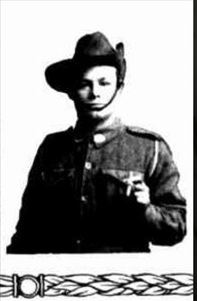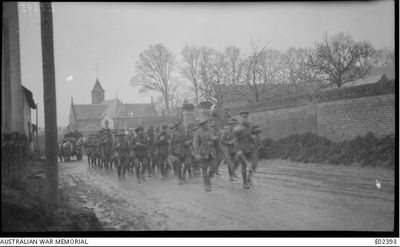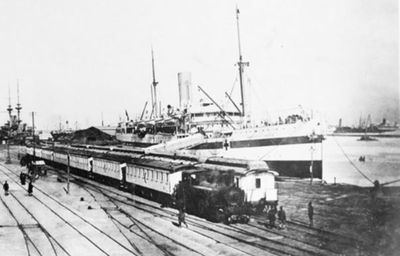Difference between revisions of "Arthur James Allen"
From Our Contribution
| (51 intermediate revisions by 4 users not shown) | |||
| Line 1: | Line 1: | ||
| − | {{ | + | {{infobox soldier |
| − | | | + | | image =[[File:Allen_Arthur_James_5794.jpg|border|400px]] |
| − | + | | caption =Western Mail | |
| − | | | + | | image2 = |
| − | | | + | | caption2 = |
| − | | | + | | dateofbirth = |
| + | | placeofbirth = Oakabella, Western Australia | ||
| + | | death = 10 May 1944 | ||
| + | | placeofdeath = Boddington, Western Australia | ||
| + | | enlistmentage = 29 years, 9 months | ||
| + | | description = 5' 6" (1.68m) tall, 143 lbs (64.9 Kg) weight; ruddy complexion; blue eyes, brown hair. | ||
| + | | height = 5' 6" (1.68m) | ||
| + | | weight = 143lbs | ||
| + | | complexion = ruddy | ||
| + | | eyes = blue | ||
| + | | hair = brown | ||
| + | | occupation = Farm hand | ||
| + | | religion = Church of England | ||
| + | | address = Kelmscott, Western Australia (NOK) | ||
| + | | relation = Father | ||
| + | | nextofkin = Mr Arthur James Allen | ||
| + | | regnumber = [https://recordsearch.naa.gov.au/SearchNRetrieve/Interface/ViewImage.aspx?B=3029076 5794] | ||
| + | | enlistmentdate = 31 May 1916 | ||
| + | | rank = Private | ||
| + | | unit = 27th Battalion, 16th Reinforcement, 7th Brigade, 2nd Division | ||
| + | | embarkationdatefrom = 30 Oct 1916 | ||
| + | | embarkationdateto = 28 Dec 1916 | ||
| + | | shipembarked = [[HMAT A16 Port Melbourne]] | ||
| + | | dateofreturnfrom = 16 Mar 1919 | ||
| + | | dateofreturnto = ?? Mar 1919 | ||
| + | | shipreturned =[[HMT Czaritza]] | ||
| + | | shipreturnednote = to Alexandria | ||
| + | | dateofreturnfrom2 =7 Apr 1919 | ||
| + | | dateofreturnto2 =7 May 1919 | ||
| + | | shipreturned2 =[[HMHS Dunluce Castle]] | ||
| + | | fate1 = Wounded in Action 12 Jun 1918 Morlancourt area | ||
| + | | fate2 = Returned to Australia. | ||
| + | | monument1 = None | ||
| + | | medal1 =[[British War Medal]] | ||
| + | | medal2 =[[Victory Medal]] | ||
| + | | medal3 = | ||
| + | }} | ||
| − | + | ==Pre War== | |
| − | + | 1910, and 1916 Electoral Rolls show his address as Oakabella, farmer. | |
| − | |||
| − | |||
| − | + | ==War Service== | |
| − | + | Enlisted in Geraldton, and after a month's basic training was allocated on 21 Jun 1916 to the 17th reinforcement draft for the 28th Battalion, and then 10 weeks later he was transferred to the 16th reinforcement draft for the 27th Battalion. Arthur shared the voyage to England with [[Thomas Ramsell]], a member of the 4th reinforcement draft for the 43rd Battalion, and [[Francis William Wakeham]], a member of the 6th reinforcement draft for the 5th Pioneer Battalion amongst others. | |
| − | |||
| − | + | On arrival in England Arthur was sent to the [[7th Training Battalion]] at [[Rollestone]], before embarking in Folkestone on the [[SS Invicta]] for France on 8 Feb 1917. Arthur was taken on strength by the [[27th Battalion]] on 12 Feb 1917, before they relieved the 22nd Battalion in the front line near Warlencourt mid way between Bapaume and Pozières, two days later. On 25 Jul 1917 Arthur was charged with "Conduct to the prejudice of good order and military discipline in that he appeared on parade unshaven". Docked two day's pay, he was also awarded 2 days Field Punishment No.2. (see notes) | |
| − | |||
| − | |||
| − | |||
| − | |||
| − | |||
| − | |||
| − | |||
| − | |||
| − | |||
| − | |||
| − | |||
| − | |||
| − | |||
| − | |||
| − | |||
| − | |||
| − | |||
| − | |||
| − | |||
| − | |||
| − | |||
| − | |||
| − | |||
| − | |||
| − | |||
| − | |||
| − | |||
| − | |||
| − | |||
| − | |||
| − | |||
| − | |||
| − | |||
| − | |||
| − | |||
| − | |||
| − | |||
| − | |||
| − | |||
| − | |||
| − | |||
| − | |||
| − | |||
| − | |||
| − | |||
| − | |||
| − | |||
| − | |||
| − | |||
| − | |||
| − | |||
| − | |||
| − | |||
| − | |||
| − | |||
| − | |||
| − | |||
| − | |||
| − | |||
| − | |||
| − | + | On 12 Jun 1918, Arthur suffered a Gunshot wound to his left leg, which required it to later be amputated above the knee. In all likelihood this injury was caused by enemy shell fire as during the evening of 10/11 June the 27th Battalion had attacked and captured the German front line of trenches in the Sailly-Le-Sec area before the Germans had retaliated with heavy shelling of the Battalion's new positions on the 11th and 12th June 1918. Initially his wounds were dressed by the [[4th Field Ambulance]] and checked at the 5th Casualty Clearing Station before being placed on an [[Ambulance Train]] on 14 Jun 1918 for the 1st USA General Hospital where he was cared for from 15 - 21 Jun 1918 before being evacuated to England on 21 Jun 1918 aboard [[HMHS Grantully Castle]] . | |
| − | |||
| − | |||
| − | + | In England he was admitted to the Kitchener Military Hospital in Brighton on 22nd June. On 9 Sep 1918 he was transferred to the [[2nd Australian Auxiliary Hospital]] and given furlough on the 24 Sep 1918. During his return home he was trans-shipped at Alexandria, Egypt before being discharged by the 5th Military District on 16 Jun 1919. | |
| − | |||
| − | + | <div><ul> | |
| + | <li style="display: inline-block;"> [[File:Allen_AJ_27th_Bn.jpg|thumb|none|400px|Elements of the 27th Battalion marching through streets to relieve colleagues in Dernancourt and Villers-Bretonneux sectors AWM EO2393 - 7 April 1918]] </li> | ||
| + | <li style="display: inline-block;"> [[File:Allen_Arthur_HS _Grantully _Castle.jpg|thumb|none|400px|HS Grantully Castle and Hospital Train]] </li> | ||
| + | </ul></div> | ||
| − | + | ==Post War== | |
| − | + | Private A. J. Allen, who recently returned from the front, was accorded a cordial welcome home at the residence of Mrs. A. R Jackson, a gathering of fully 150 people driving long distances to be present. Mr. L. C. Burges, Jnr. presided and several speeches of welcome were made, to which Private A. J. Allen responded. Dancing was kept up until a late hour, and an excellent supper was provided. It was suggested that in order to assist Private Allen, who has lost a leg, the farmers present should undertake to put in 40 acres of crop for him. The suggestion was warmly supported, and it was eventually decided that each farmer in the Oakabella and Howatharra districts should put in 5 acres for Private Allen's benefit.<ref>{{cite news |url=http://nla.gov.au/nla.news-article37612187 |title=COUNTRY. |newspaper=Western Mail |volume=XXXIV, |issue=1,745 |location=Western Australia |date=6 June 1919 |accessdate=9 May 2017 |page=33 |via=National Library of Australia}}</ref> | |
| − | + | The movement originated amongst the settlers of Oakabella and Howatharra to put in a crop for Private A. J. Allen, who has returned from the war minus a leg, is being supported most whole-heartedly. Mr. W. H. James, of Windemere Estate, has placed 130 acres at the disposal of the committee, and promises of assistance to prepare, seed, and crop the land are being generously made. The land is now in course of preparation, and on Monday, June 1, the farmers will pull in with their teams, and will suspend work on their own farms until the whole of the 130 acres are seeded. A special occasion will be made of the day, and a big muster from all over the district will be seen.<ref>{{cite news |url=http://nla.gov.au/nla.news-article37612405 |title=COUNTRY |newspaper=[[Western Mail]] |volume=XXXIV, |issue=1,746 |location=Western Australia |date=13 June 1919 |accessdate=16 May 2017 |page=28 |via=National Library of Australia}} </ref> | |
| − | |||
| − | + | ALLEN. On May 10, 1944, suddenly, at Boddington, Arthur James, loved brother-in-law of Beth and Vic Quarrell, fond uncle of Bess and Stan.<ref>{{cite news |url=http://nla.gov.au/nla.news-article44809276 |title=Family Notices |newspaper=[[The West Australian]] |volume=60, |issue=18,047 |location=Western Australia |date=13 May 1944 |accessdate=16 May 2017 |page=1 |via=National Library of Australia}} </ref> | |
| − | |||
| − | + | In 1922 and 1925 he was listed as a poultry farmer in East Jandakot; and between 1931 and 1944 as living in Boddington, employed as a farmer. | |
| − | + | ==Notes== | |
| + | Field punishment could be awarded by a court martial or a commanding officer for any offence committed on active service. There were two categories of field punishment. Field punishment No. 2 consisted of heavy labouring duties, and several hours a day shackled . All offenders awarded field punishment would march with their unit, carry their arms and accoutrements, perform all their military duties as well as extra fatigue duties, and be treated as defaulters. | ||
| − | |||
| − | |||
| − | |||
<references /> | <references /> | ||
==External Links== | ==External Links== | ||
| + | *[https://aif.adfa.edu.au/showPerson?pid=2998 AIF Project] | ||
| + | *[https://rslvirtualwarmemorial.org.au/explore/people/254842 RSL Memorial] | ||
| − | + | {{DEFAULTSORT:Allen , Arthur James}} | |
| − | [[:Category: | + | [[Category:Soldier]] |
| + | [[Category:Born Australia]] | ||
| + | [[Category:Born WA]] | ||
| + | [[Category:1918 WIA]] | ||
| + | [[Category:Returned to Australia]] | ||
| + | [[Category:Farm hand]] | ||
| + | [[Category:Church of England]] | ||
| + | [[Category:Armadale-Kelmscott]] | ||
Latest revision as of 15:32, 26 February 2021
 Western Mail | |
| Personal Information | |
|---|---|
| Date of Birth | Not known |
| Place of Birth | Oakabella, Western Australia |
| Death | 10 May 1944 |
| Place of Death | Boddington, Western Australia |
| Age at Enlistment | 29 years, 9 months |
| Description |
5' 6" (1.68m) tall ; 143lbs 64.864 kg ; ruddy complexion ; blue eyes ; brown hair |
| Occupation | Farm hand |
| Religion | Church of England |
| Address | Kelmscott, Western Australia (NOK) |
| Next of Kin | Father , Mr Arthur James Allen |
| Military Information | |
| Reg Number | 5794 |
| Date of Enlistment | 31 May 1916 |
| Rank | Private |
| Unit/Formation | 27th Battalion, 16th Reinforcement, 7th Brigade, 2nd Division |
| Date of Embarkation | 30 Oct 1916 ‒ 28 Dec 1916 |
| Ship Embarked On | HMAT A16 Port Melbourne |
| Date of Return | 16 Mar 1919 ‒ ?? Mar 1919 |
| Ship Returned On | HMT Czaritza to Alexandria |
| Date of Return | 7 Apr 1919 ‒ 7 May 1919 |
| Ship Returned On | HMHS Dunluce Castle |
| Fate |
Wounded in Action 12 Jun 1918 Morlancourt area Returned to Australia. |
| Monument | None |
| Medals |
British War Medal Victory Medal |
Pre War
1910, and 1916 Electoral Rolls show his address as Oakabella, farmer.
War Service
Enlisted in Geraldton, and after a month's basic training was allocated on 21 Jun 1916 to the 17th reinforcement draft for the 28th Battalion, and then 10 weeks later he was transferred to the 16th reinforcement draft for the 27th Battalion. Arthur shared the voyage to England with Thomas Ramsell, a member of the 4th reinforcement draft for the 43rd Battalion, and Francis William Wakeham, a member of the 6th reinforcement draft for the 5th Pioneer Battalion amongst others.
On arrival in England Arthur was sent to the 7th Training Battalion at Rollestone, before embarking in Folkestone on the SS Invicta for France on 8 Feb 1917. Arthur was taken on strength by the 27th Battalion on 12 Feb 1917, before they relieved the 22nd Battalion in the front line near Warlencourt mid way between Bapaume and Pozières, two days later. On 25 Jul 1917 Arthur was charged with "Conduct to the prejudice of good order and military discipline in that he appeared on parade unshaven". Docked two day's pay, he was also awarded 2 days Field Punishment No.2. (see notes)
On 12 Jun 1918, Arthur suffered a Gunshot wound to his left leg, which required it to later be amputated above the knee. In all likelihood this injury was caused by enemy shell fire as during the evening of 10/11 June the 27th Battalion had attacked and captured the German front line of trenches in the Sailly-Le-Sec area before the Germans had retaliated with heavy shelling of the Battalion's new positions on the 11th and 12th June 1918. Initially his wounds were dressed by the 4th Field Ambulance and checked at the 5th Casualty Clearing Station before being placed on an Ambulance Train on 14 Jun 1918 for the 1st USA General Hospital where he was cared for from 15 - 21 Jun 1918 before being evacuated to England on 21 Jun 1918 aboard HMHS Grantully Castle .
In England he was admitted to the Kitchener Military Hospital in Brighton on 22nd June. On 9 Sep 1918 he was transferred to the 2nd Australian Auxiliary Hospital and given furlough on the 24 Sep 1918. During his return home he was trans-shipped at Alexandria, Egypt before being discharged by the 5th Military District on 16 Jun 1919.
Post War
Private A. J. Allen, who recently returned from the front, was accorded a cordial welcome home at the residence of Mrs. A. R Jackson, a gathering of fully 150 people driving long distances to be present. Mr. L. C. Burges, Jnr. presided and several speeches of welcome were made, to which Private A. J. Allen responded. Dancing was kept up until a late hour, and an excellent supper was provided. It was suggested that in order to assist Private Allen, who has lost a leg, the farmers present should undertake to put in 40 acres of crop for him. The suggestion was warmly supported, and it was eventually decided that each farmer in the Oakabella and Howatharra districts should put in 5 acres for Private Allen's benefit.[1]
The movement originated amongst the settlers of Oakabella and Howatharra to put in a crop for Private A. J. Allen, who has returned from the war minus a leg, is being supported most whole-heartedly. Mr. W. H. James, of Windemere Estate, has placed 130 acres at the disposal of the committee, and promises of assistance to prepare, seed, and crop the land are being generously made. The land is now in course of preparation, and on Monday, June 1, the farmers will pull in with their teams, and will suspend work on their own farms until the whole of the 130 acres are seeded. A special occasion will be made of the day, and a big muster from all over the district will be seen.[2]
ALLEN. On May 10, 1944, suddenly, at Boddington, Arthur James, loved brother-in-law of Beth and Vic Quarrell, fond uncle of Bess and Stan.[3]
In 1922 and 1925 he was listed as a poultry farmer in East Jandakot; and between 1931 and 1944 as living in Boddington, employed as a farmer.
Notes
Field punishment could be awarded by a court martial or a commanding officer for any offence committed on active service. There were two categories of field punishment. Field punishment No. 2 consisted of heavy labouring duties, and several hours a day shackled . All offenders awarded field punishment would march with their unit, carry their arms and accoutrements, perform all their military duties as well as extra fatigue duties, and be treated as defaulters.
- ↑ "COUNTRY.". Western Mail. XXXIV, (1,745). Western Australia. 6 June 1919. p. 33. Retrieved 9 May 2017 – via National Library of Australia.
- ↑ "COUNTRY". Western Mail. XXXIV, (1,746). Western Australia. 13 June 1919. p. 28. Retrieved 16 May 2017 – via National Library of Australia.
- ↑ "Family Notices". The West Australian. 60, (18,047). Western Australia. 13 May 1944. p. 1. Retrieved 16 May 2017 – via National Library of Australia.

